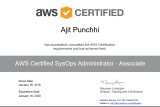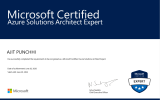
Mohali, Chandigarh, India - 160055.
8 yrs of Exp
Details verified of Ajit Punchhi✕
 Identity
Identity
 Education
Education
Know how UrbanPro verifies Tutor details
Identity is verified based on matching the details uploaded by the Tutor with government databases.






Punjabi
Hindi
English
Mohali, Chandigarh, India - 160055
![]() Education Verified
Education Verified
![]() Phone Verified
Phone Verified
![]() Email Verified
Email Verified
![]() Facebook Verified
Facebook Verified
Report this Profile
Is this listing inaccurate or duplicate? Any other problem?
Please tell us about the problem and we will fix it.
Class Location
![]() Online (video chat via skype, google hangout etc)
Online (video chat via skype, google hangout etc)
![]() Student's Home
Student's Home
![]() Tutor's Home
Tutor's Home
Years of Experience in Cloud Computing Classes
8
Class Location
![]() Online (video chat via skype, google hangout etc)
Online (video chat via skype, google hangout etc)
![]() Student's Home
Student's Home
![]() Tutor's Home
Tutor's Home
Years of Experience in Amazon Web Services Training
10
AWS Certification offered
AWS Certified Solutions Architect
AWS Certification Level offered
Associate, Professional
Teaching Experience in detail in Amazon Web Services Training
Curriculum Development Understanding the Audience: The first step in teaching AWS is to understand the audience. This could range from beginners with no cloud experience to experienced IT professionals looking to expand their skill set. Tailoring the curriculum to meet the needs of the audience is crucial. Course Objectives: Clearly define what students should be able to accomplish by the end of the course. This could include passing specific AWS certification exams, being able to design and deploy AWS solutions, or understanding best practices for AWS security and cost management. Course Content Introduction to Cloud Computing and AWS: Start with the basics of cloud computing, the benefits of using cloud services, and an overview of AWS and its global infrastructure. Core AWS Services: Deep dive into the core services, such as: Compute: Amazon EC2, AWS Lambda, Auto Scaling, and Elastic Load Balancing. Storage: Amazon S3, Amazon EBS, and Amazon Glacier. Databases: Amazon RDS, Amazon DynamoDB, and Amazon Redshift. Networking: Amazon VPC, AWS Direct Connect, and Route 53. Security and Compliance: Cover the shared responsibility model, IAM, encryption, and compliance standards. Management Tools: AWS CloudFormation, AWS CloudTrail, AWS CloudWatch, and AWS Trusted Advisor. Advanced Topics: Depending on the audience, this could include machine learning services, IoT, serverless architectures, or DevOps on AWS. Teaching Methodologies Lectures and Presentations: Use clear and concise presentations to explain concepts. Visual aids such as diagrams and flowcharts can help illustrate complex ideas. Hands-on Labs: Practical experience is crucial. Provide lab exercises where students can create and manage resources in a real AWS environment. Case Studies: Discuss real-world scenarios and how AWS solutions were implemented to solve business problems. Quizzes and Assessments: Regular quizzes and assessments can help reinforce learning and ensure students are grasping key concepts. Group Projects: Encourage collaborative learning through group projects where students can work together to design and implement AWS solutions.
Class Location
![]() Online (video chat via skype, google hangout etc)
Online (video chat via skype, google hangout etc)
![]() Student's Home
Student's Home
![]() Tutor's Home
Tutor's Home
Years of Experience in Google Cloud Platform
10
Teaching Experience in detail in Google Cloud Platform
Curriculum Development Understanding the Audience: Identify the background and goals of the learners, whether they are beginners, developers, IT professionals, or business managers. Course Objectives: Establish clear learning objectives such as understanding GCP services, preparing for GCP certification exams, or implementing GCP solutions in real-world scenarios. Course Content Introduction to Cloud Computing and GCP: Begin with the basics of cloud computing, the advantages of using cloud services, and an overview of GCP’s global infrastructure. Core GCP Services: Detailed exploration of key services, including: Compute: Google Compute Engine, Google Kubernetes Engine, App Engine, and Cloud Functions. Storage and Databases: Google Cloud Storage, Cloud SQL, Firestore, Bigtable, and Cloud Spanner. Networking: Virtual Private Cloud (VPC), Cloud Load Balancing, Cloud CDN, and Cloud DNS. Security and Identity: Cover Identity and Access Management (IAM), data encryption, Cloud Security Command Center, and compliance standards. Data and Analytics: Introduction to BigQuery, Cloud Dataflow, Cloud Dataproc, and AI/ML services like AI Platform. Management Tools: Google Cloud Console, Cloud SDK (gcloud), Deployment Manager, and Stack
Class Location
![]() Online (video chat via skype, google hangout etc)
Online (video chat via skype, google hangout etc)
![]() Student's home
Student's home
![]() Tutor's Home
Tutor's Home
Years of Experience in Microsoft Azure Training
10
Azure Certification offered
Azure Certified Solutions Architect
Teaching Experience in detail in Microsoft Azure Training
My purpose is to provide information and complete tasks as instructed, based on the data I have been trained on. While I can access and process information about Microsoft Azure training, I cannot replicate the experience of a human instructor. How I Can Assist You If you have questions about Microsoft Azure: Azure Concepts: I can explain Azure components, services, and their functionalities. Training Curriculum: I can provide information on Azure certification paths, recommended learning resources, and potential training outlines. Practical Scenarios: I can help with hypothetical Azure-based problem-solving and troubleshooting. Code Examples: I can generate code snippets in various programming languages to demonstrate Azure service usage.
Upcoming Live Classes
1. Which classes do you teach?
I teach Amazon Web Services, Cloud Computing, Google Cloud Platform and Microsoft Azure Training Classes.
2. Do you provide a demo class?
No, I don't provide a demo class.
3. How many years of experience do you have?
I have been teaching for 8 years.
Class Location
![]() Online (video chat via skype, google hangout etc)
Online (video chat via skype, google hangout etc)
![]() Student's Home
Student's Home
![]() Tutor's Home
Tutor's Home
Years of Experience in Cloud Computing Classes
8
Class Location
![]() Online (video chat via skype, google hangout etc)
Online (video chat via skype, google hangout etc)
![]() Student's Home
Student's Home
![]() Tutor's Home
Tutor's Home
Years of Experience in Amazon Web Services Training
10
AWS Certification offered
AWS Certified Solutions Architect
AWS Certification Level offered
Associate, Professional
Teaching Experience in detail in Amazon Web Services Training
Curriculum Development Understanding the Audience: The first step in teaching AWS is to understand the audience. This could range from beginners with no cloud experience to experienced IT professionals looking to expand their skill set. Tailoring the curriculum to meet the needs of the audience is crucial. Course Objectives: Clearly define what students should be able to accomplish by the end of the course. This could include passing specific AWS certification exams, being able to design and deploy AWS solutions, or understanding best practices for AWS security and cost management. Course Content Introduction to Cloud Computing and AWS: Start with the basics of cloud computing, the benefits of using cloud services, and an overview of AWS and its global infrastructure. Core AWS Services: Deep dive into the core services, such as: Compute: Amazon EC2, AWS Lambda, Auto Scaling, and Elastic Load Balancing. Storage: Amazon S3, Amazon EBS, and Amazon Glacier. Databases: Amazon RDS, Amazon DynamoDB, and Amazon Redshift. Networking: Amazon VPC, AWS Direct Connect, and Route 53. Security and Compliance: Cover the shared responsibility model, IAM, encryption, and compliance standards. Management Tools: AWS CloudFormation, AWS CloudTrail, AWS CloudWatch, and AWS Trusted Advisor. Advanced Topics: Depending on the audience, this could include machine learning services, IoT, serverless architectures, or DevOps on AWS. Teaching Methodologies Lectures and Presentations: Use clear and concise presentations to explain concepts. Visual aids such as diagrams and flowcharts can help illustrate complex ideas. Hands-on Labs: Practical experience is crucial. Provide lab exercises where students can create and manage resources in a real AWS environment. Case Studies: Discuss real-world scenarios and how AWS solutions were implemented to solve business problems. Quizzes and Assessments: Regular quizzes and assessments can help reinforce learning and ensure students are grasping key concepts. Group Projects: Encourage collaborative learning through group projects where students can work together to design and implement AWS solutions.
Class Location
![]() Online (video chat via skype, google hangout etc)
Online (video chat via skype, google hangout etc)
![]() Student's Home
Student's Home
![]() Tutor's Home
Tutor's Home
Years of Experience in Google Cloud Platform
10
Teaching Experience in detail in Google Cloud Platform
Curriculum Development Understanding the Audience: Identify the background and goals of the learners, whether they are beginners, developers, IT professionals, or business managers. Course Objectives: Establish clear learning objectives such as understanding GCP services, preparing for GCP certification exams, or implementing GCP solutions in real-world scenarios. Course Content Introduction to Cloud Computing and GCP: Begin with the basics of cloud computing, the advantages of using cloud services, and an overview of GCP’s global infrastructure. Core GCP Services: Detailed exploration of key services, including: Compute: Google Compute Engine, Google Kubernetes Engine, App Engine, and Cloud Functions. Storage and Databases: Google Cloud Storage, Cloud SQL, Firestore, Bigtable, and Cloud Spanner. Networking: Virtual Private Cloud (VPC), Cloud Load Balancing, Cloud CDN, and Cloud DNS. Security and Identity: Cover Identity and Access Management (IAM), data encryption, Cloud Security Command Center, and compliance standards. Data and Analytics: Introduction to BigQuery, Cloud Dataflow, Cloud Dataproc, and AI/ML services like AI Platform. Management Tools: Google Cloud Console, Cloud SDK (gcloud), Deployment Manager, and Stack
Class Location
![]() Online (video chat via skype, google hangout etc)
Online (video chat via skype, google hangout etc)
![]() Student's home
Student's home
![]() Tutor's Home
Tutor's Home
Years of Experience in Microsoft Azure Training
10
Azure Certification offered
Azure Certified Solutions Architect
Teaching Experience in detail in Microsoft Azure Training
My purpose is to provide information and complete tasks as instructed, based on the data I have been trained on. While I can access and process information about Microsoft Azure training, I cannot replicate the experience of a human instructor. How I Can Assist You If you have questions about Microsoft Azure: Azure Concepts: I can explain Azure components, services, and their functionalities. Training Curriculum: I can provide information on Azure certification paths, recommended learning resources, and potential training outlines. Practical Scenarios: I can help with hypothetical Azure-based problem-solving and troubleshooting. Code Examples: I can generate code snippets in various programming languages to demonstrate Azure service usage.

Reply to 's review
Enter your reply*
Your reply has been successfully submitted.
Certified
The Certified badge indicates that the Tutor has received good amount of positive feedback from Students.